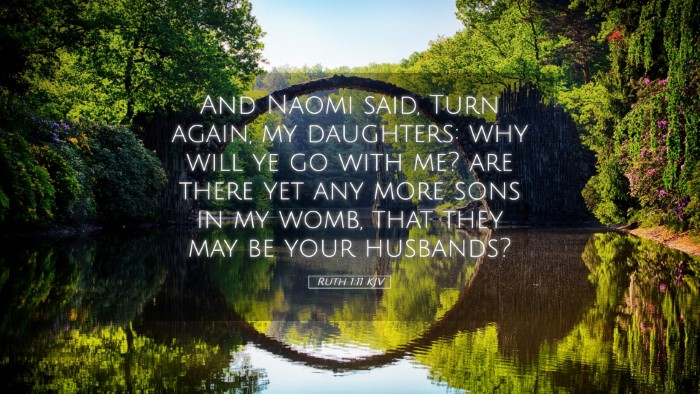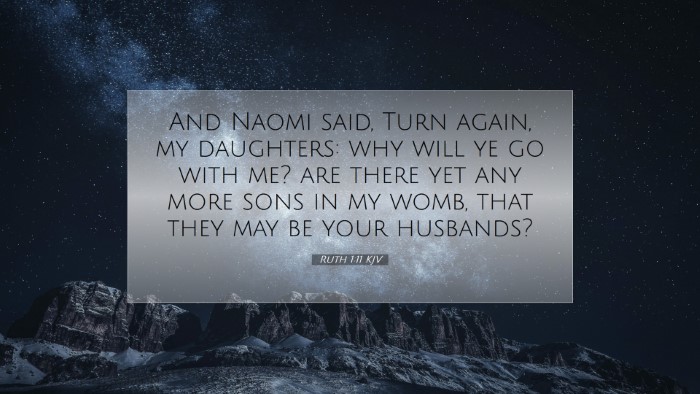Old Testament
Genesis Exodus Leviticus Numbers Deuteronomy Joshua Judges Ruth 1 Samuel 2 Samuel 1 Kings 2 Kings 1 Chronicles 2 Chronicles Ezra Nehemiah Esther Job Psalms Proverbs Ecclesiastes Song of Solomon Isaiah Jeremiah Lamentations Ezekiel Daniel Hosea Joel Amos Obadiah Jonah Micah Nahum Habakkuk Zephaniah Haggai Zechariah MalachiRuth 1:11
Ruth 1:11 KJV
And Naomi said, Turn again, my daughters: why will ye go with me? are there yet any more sons in my womb, that they may be your husbands?
Ruth 1:11 Bible Commentary
Commentary on Ruth 1:11
Ruth 1:11 states: "But Naomi said, 'Turn back, my daughters; why will you go with me? Are there still sons in my womb, that they may be your husbands?' This verse marks a pivotal moment in the narrative of Ruth, where Naomi addresses her daughters-in-law, Ruth and Orpah, urging them to return to their own families in Moab rather than accompany her back to Bethlehem. This passage serves as a profound exploration of loyalty, providence, and the complexities of familial relationships.
Context and Background
The book of Ruth is set during the era of the Judges, a time of great tumult and moral decline in Israel. Naomi, a Israelite widow, has lost her husband and two sons in Moab and is returning to her homeland, now bereft and desolate. Prior to this plea, the text describes Naomi's bitterness over her circumstances, which underscores a deeper sorrow that pervades her dialogue.
Theological Insights
- Naomi's Bitterness and Concern: Naomi's reference to being without sons reveals her concern for the welfare of Ruth and Orpah. The cultural implications of widowhood and the lack of progeny would have significant ramifications for these women, both socially and economically.
- The Theme of Return: Naomi's urging for her daughters-in-law to 'turn back' signifies not just a physical return but a spiritual and emotional redirection back to their roots. This invitation reflects broader themes of repentance and reconnection with one's heritage, a recurring motif in the biblical narrative.
- Covenantal Loyalty: The verse invites contemplation of the depth of the relationships formed in the context of covenant. Ruth’s eventual refusal to return and her pledge of loyalty to Naomi (Ruth 1:16) reveal a profound commitment that transcends societal norms.
Commentary from Matthew Henry
Matthew Henry notes that Naomi is acting in the interest of her daughters; her request emanates from a genuine desire for their wellbeing rather than a lack of affection. He emphasizes the importance of recognizing the dire circumstances faced by these women, who would have been left vulnerable without husbands. Henry also highlights the emotional weight of Naomi’s words, reflecting her deep sorrow and resignation to her fate.
Commentary from Albert Barnes
Albert Barnes provides a historical context surrounding the importance of offspring for women in ancient Israel. His commentary elaborates on the social structures that placed heavy burdens on widows, and how Naomi's pragmatic advice reflects a realistic understanding of their precarious position. He sees Naomi's speech as encapsulating her care for the future of her daughters, emphasizing that it is not the end of their journeys, but a necessary decision based on their societal roles.
Commentary from Adam Clarke
Adam Clarke delves into the emotional and spiritual implications of Naomi's plea for her daughters to return. He suggests that Naomi, acutely aware of her state of hardship, recognizes the impossibility of providing for them if they were to remain with her. Clarke notes that her appeal is rooted in love, advising them to seek better fortunes among their own people rather than risking the unknown hardships of Israel as a widow.
Application for Today
- Understanding Suffering: Pastors and theologians can glean from Naomi's experience a potential framework for discussing suffering and loss in their congregations. Naomi’s acknowledgment of her grief is an invitation for believers to express their struggles rather than hide them.
- Community and Relationships: Ruth's choice to stay highlights the significance of community and relationships that extend beyond bloodlines. Modern readers can reflect on their own commitments to one another as they navigate difficult circumstances.
- God's Providence: The underlying assertion of God's providence is crucial. Naomi's journey, fraught with despair, serves as a prelude to God's redeeming work through Ruth. Understanding this can encourage believers to trust in God’s plans, even amidst challenging situations.
Conclusion
Ruth 1:11 provides a rich tapestry of themes that resonate with the human experience of loss and the quest for belonging. The insights garnered from the commentaries of Matthew Henry, Albert Barnes, and Adam Clarke offer valuable perspectives for deeper understanding for pastors, students, and scholars alike. As we reflect on Naomi's heartfelt plea, we are reminded of the complexities of loyalty, the intricacies of relationships, and the ever-present possibility of redemption woven throughout the biblical narrative.


